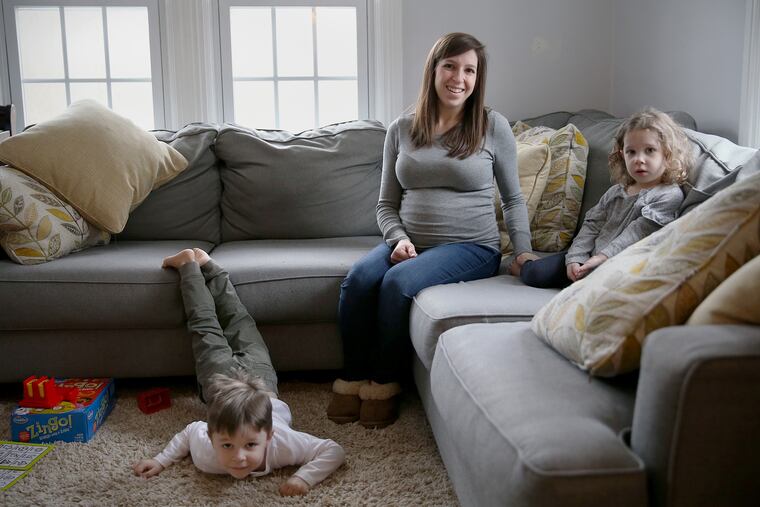Doylestown mom ‘stunned’ after Inquirer reader pays miscarriage bills
After reading in the Inquirer about the $325 in medical debt Alyssa Collier had in collections from a miscarriage two years ago, a reader stepped up to pay the bill.

A benevolent reader of The Inquirer has stepped up to pay the delinquent medical bills of a mother of two who fell into debt after a miscarriage.
Alyssa Collier, 29, of Doylestown, was among the women who shared their experience with the cost of miscarriage in a February Inquirer story. Collier miscarried in the ninth week of her third pregnancy and two years later $325 in unpaid medical bills from her care were still in collections, a daily reminder of one of the worst days of her life.
After reading Collier’s story, a Doylestown man reached out to The Inquirer offering to pay the bills. The man, who asked to remain anonymous, was one of several who made such offers.
“It’s not a lot of money for me and I couldn’t think of spending it on a more worthy cause,” he said in an email.
He said he feels compelled to help people who are working hard to support their families but need some extra support.
Collier has private health insurance that paid for much of the care she received during her pregnancy. But she still owed several hundred dollars for a procedure she needed to remove excess tissue after the miscarriage, hospital treatment for an infection following the procedure and genetic testing to find out what had happened.
She was caught off guard by the bills because the birth of her son a year earlier had been covered by insurance. A part-time waitress who has separated from her husband since the miscarriage in 2017, Collier paid what she could and the remaining $325 ended up in collections.
>>PREVIOUS COVERAGE: Families grieving a pregnancy loss hit especially hard by medical bills: ‘I wasn’t prepared at all’
It was stressful knowing the bills were in collections, potentially damaging her credit rating, but she just didn’t have the savings to cover them, Collier said. She doesn’t think she’ll ever completely recover emotionally from the loss of her child, but said getting the debt paid is a huge relief.
Collier said she was stunned and overwhelmed by the generosity of a stranger.
“He said it was really small, but to me it was really big,” she said. “I just never thought someone would care enough to do something like that.”
To resolve the bills, the man contacted the collections agencies holding Collier’s debt and made payments directly to the agencies.
At a time when 40 percent of Americans don’t have enough savings to cover a $400 emergency and medical debt is a top reason for personal bankruptcy, such philanthropic gestures seem to be on the rise.
RIP Medical Debt, a New York-based nonprofit, raises money from donors that it uses to purchase and forgive portfolios of medical debt owed by people with low incomes or debt that exceeds their assets.
A third of the money raised through GoFundMe, a fund-raising website that allows individuals to create campaigns for their own cause, goes toward medical costs, the company’s CEO, Rob Solomon, told Kaiser Health News.
The site has been criticized for supporting campaigns for scientifically unproven and potentially dangerous medical treatments. But the website is also full of families caught off-guard by major medical events — including miscarriages — and looking for help.
In an interview with KHN, Solomon said the trend speaks to a serious problem with the health-care system, with too many people being let down by the insurance and government programs they count on to help pay for care.
“The only thing you can really do is rely on the kindness of friends and family and community,” he said.